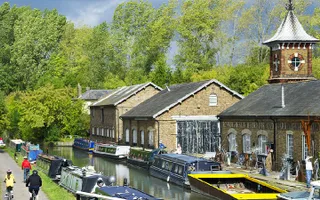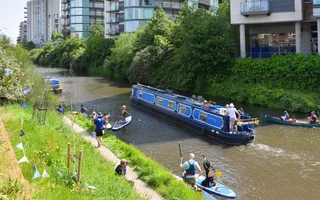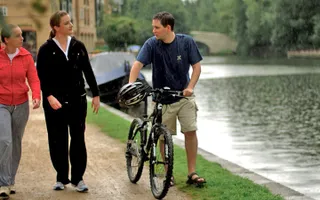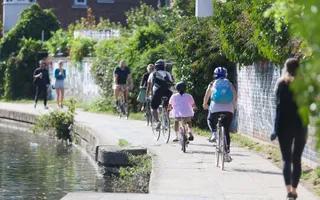Our canals and rivers are a treasured resource for everyone to enjoy and share. This guidance promotes considerate and courteous behaviour for us all.
With thousands of people fishing, boating and using the canals and rivers for recreation, it’s more important than ever that we all look after our waterways, consider others, take care and stay safe.
Alongside our Towpath Code, this Waterway Code for Anglers and Boaters sets out guidance to help ensure everyone is clear about what is expected of them.
Advice for everyone
Look after your waterways and consider others:
- Protect the environment and help to keep the waterways a pleasant place for all users and wildlife
- Follow the Check, Clean, Dry Code to help prevent the spread of aquatic non-native invasive species
- Keep noise to a minimum
- Don’t damage the vegetation or banks
- Take home everything that you brought with you and leave the site as you found it. Never flytip on the towpath
- If you have a dog, make sure you clear up after them and keep them under control. It’s advisable that they wear a doggy Personal Floatation Device (PFD)
- Don’t light fires
BE SAFE – Stay Away From the Edge
- Always keep young children under supervision
- Not all towpaths have smooth surfaces, take care when walking and cycling
- Keep off the ice. If the water appears frozen, never trust the ice to take your weight
- Watch out for concealed mooring pins (especially in long grass) or ropes near the path beside moored boats
- The risks are small, but tell your doctor if you become ill within two weeks of getting canal, river or reservoir water into your mouth or an open wound as Weils Disease (Leptospirosis) can be contracted from open water
- Be prepared for changes in weather and local water conditions
- Swimming is prohibited in Canal & River Trust canals and rivers
Things can go wrong on canals. Learn what to do in an emergency.
If someone falls in and needs help:
- Do not dive into the water
- Keep calm – think before you act
- Don’t put yourself in danger
- Raise the alarm
- Get help on the towpath
- Phone the emergency services and follow the advice they give
- Look around for a life belt or throw line
- Talk to the person or animal in the water
- Urge them to swim towards the bank
If you see something dangerous, such as serious damage to a structure or water escaping, call our emergency helpline 0800 47 999 47. For other emergencies when lives are at risk (including serious injury, illness, fatality, rescue help, fire or explosion on a boat) call 999.
Use the what3words app to help define your location. All bridges and locks are numbered or named. To report non-emergency issues call us on 0303 040 4040 or contact us online.
- Report pollution, fly tipping or fish in distress to the Environment Agency (in England) on 0800 80 7060 or Natural Resources Wales (in Wales) on 0300 65 3000.
- Report birds or animals in distress to the RSPCA on 0300 1234 999.
Advice for boats with engines
Your boat needs a licence, Boat Safety Certificate and insurance.
Look after your waterways
- Avoid creating a breaking wash. This can cause damage to the waterway, and will disturb fish and wildlife
- Don’t run your propeller while moored; it can be dangerous if someone falls overboard
- Help keep the water clean and free from oil, diesel, petrol, detergents and other harmful substances. Use environmentally friendly products if possible
- Never dump rubbish, sewage or oily bilge water into the water or onto the bank
Consider others
- Take care to position mooring pins, ropes and cables so they are not a danger to towpath users – if possible make them conspicuous with a marker, a cover or by painting the top a bright colour. Make sure not to leave mooring pins behind
- Don’t obstruct locks, bridges, water points, access at canoe portage landings or turning (winding) points. If two boats meet at bridges room is needed for one to pull in so they can pass
- Only stay on a water point or a lock landing when you’re filling up or locking through
- Don’t steal locks set against you and take time to check all paddles and gates are shut after you’ve used a lock
- Only double moor or moor wide beam boats in places where navigation will not be obstructed. Only moor against another boat when you have permission from the other boater to do so
- Boat crews need access to the bank within 25 metres of locks or moveable bridges so do not moor there unless you’re using the bridge or lock. In some locations and at busy times, more space on lock landings and by moveable bridges will need to be kept clear of moored boats
- When passing anglers, keep to the centre of the channel, in single file
- Slow down when passing moored boats, unpowered boats and anglers
- Please do not moor where signage advises that mooring is temporarily suspended. Please note the local signs concerning waterway events and fishing matches. Sign up to receive notices for stoppages and events
- When mooring on the towpath outside designated mooring sites, try to leave at least a five metre gap between the adjacent craft to allow for access for fishing and canoes/kayaks
- On towpaths, do not moor up in front of anglers
- Be considerate when running engines and generators for battery charging. The noise can be intrusive for other people. This should be limited to times between 8.00 am and 8.00 pm
- Please remember that if you want to fish from your boat you will still need both a fishing permit and a rod licence from either the Environment Agency or Natural Resources Wales
- Many waterways are popular with paddlers (including canoeists, kayakers and stand up paddle boards (SUPs) users) and rowing clubs operate on some of our rivers and wider canals. Please look out for and be aware of other waterway users.
Sharing the space when it gets busy is important. Remember the excitement of your own first boat trip – we were all learners once. The beauty of canal boat holidays lies in the slower pace. So, practice patience with your fellow boaters. Don’t rush anyone or push ahead. If you already know what you're doing, offer to help newer boaters. If you’re going through double locks, pair up with another boat to halve the work and save water.
Take care
- You and your crew must understand how to operate your boat and navigate locks, bridges and tunnels
- Read the Boater’s Handbook before setting off
- Watch your footing to avoid falls
- Pay attention to avoid collisions
- Don’t use your body to try and stop the boat; you could get crushed
- Take things easy, don’t strain
- Understand the risks of fire and explosions on boats







